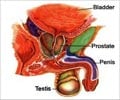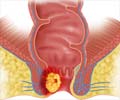First clinical guidance on anal intercourse after prostate cancer has been developed, which recommends that men who practice anal route should abstain before, during and after diagnosis and treatment of prostate cancer.
- The first clinical guidance addressing anal intercourse after prostate cancer has been developed
- It advises that gay and bisexual men should abstain from anal intercourse before, during and after diagnosis and treatment of prostate cancer
- It will help to promote safer sexual practices among high-risk groups such as gay and bisexual men
Read More..
What is the Importance of the Guideline?
No guidelines currently exist for advising gay and bisexual men who practice anal intercourse in conjunction with prostate cancer. Men are usually advised to resume sexual activities after prostate cancer treatment as its help to maintain normal erectile function. However, gay and bisexual men, who participate in anal intercourse could be at a higher risk of physical damage, following prostate surgery or radiotherapy. Moreover, doctors generally don’t ask men about their sexual orientation or sexual practices, thus depriving them of useful advice and support for practicing safe sex. The importance of the new guideline lies in the fact that it presents clear-cut recommendations for men having anal intercourse before, during, and after diagnosis and treatment of prostate cancer.How was the Guideline Developed?
The guideline is based on the consensus opinion of 11 urological surgeons and 15 clinical oncologists who were recommended by the Royal College of Radiologists, Prostate Cancer UK, the British Uro-oncology Group, the Gay and Lesbian Association of Doctors and Dentists, and the British Association of Urological Surgeons.The guideline coordinator was Sean Ralph, who is a therapeutic radiographer at the Clatterbridge Cancer Center NHS Foundation Trust, Birkenhead, Wirral, UK. He is also the Co-Founder of ‘Out with Prostate Cancer’, which is the first prostate cancer support group in the UK exclusively for gay and bisexual men.
Key Recommendations of the Guideline
Investigation / Intervention | Timeframe | Expert Opinion |
Prior to prostate-specific antigen (PSA) test | 1 week | May lead to an inaccurate result |
After transrectal ultrasound scan (TRUS) | 2 weeks | May cause pain, bleeding and increased risk of infections |
After transperineal biopsy | 1 week | Will allow bruising to resolve and reduce painful intercourse |
After radical prostatectomy | 6 weeks | May cause pain, bleeding and increased risk of urinary incontinence |
After external beam radiotherapy | 8 weeks | Acute side effects could become worse, causing pain and chronic rectal bleeding |
After permanent seed brachytherapy | 6 months | Will reduce risk of radiation exposure to sex partner |
How was the Consensus Reached while Formulating the Recommendations?
The recommendations on how long men should abstain from anal intercourse following prostate cancer diagnosis and treatment varied widely. The consensus was reached by taking into consideration the common opinions, as there is no clear clinical evidence available on the topic. The opinions of the highly experienced prostate cancer specialists enabled formulation of the guideline, which is the first of its kind. Importantly, this guideline will help to inform both doctors and patients about best practices, based on clinical experience and judgment.The guideline has already been put into practice by Prostate Cancer UK for treating prostate cancer patients.
Doctors in the Panel didn’t Practice what they Preached – An Eye Opener!
Despite the fact that all the panelists agreed that it was important to abstain from anal intercourse following prostate cancer, very few of them followed these recommendations, as revealed by the following figures:- 3 of 26 panelists (12%) asked patients about their sexual orientation and sexual practices
- 2 of 26 panelists (8%) asked patients about anal intercourse, if they were aware that the patient was gay or bisexual
Expert Comments
Dr. John Burton, Principal Radiographer, Pre-Treatment, Radiotherapy at Edinburgh Cancer Center and UKIO Vice-President, Oncology, expressed his opinion in an independent capacity as he was not involved in the development of the guideline. He said: “This guidance will be invaluable to clinicians and people receiving treatment for prostate cancer. It is long overdue, and addresses inequality in the level of information available to patients. This will not just benefit patient care in the UK, but as the first guidance of its kind in the world, it will inevitably have an impact across the cancer community globally. More generally, this work is about not making assumptions but instead listening to the patient and providing them with advice appropriate to their situation; this is something we need to remember with every patient.”Catherine Winsor, who is Deputy Director of Support and Influencing at Prostate Cancer UK said: “Our specialist nurses often get asked how long men should abstain from having intercourse before, during and after different tests and treatments for prostate cancer, from both patients and the professionals who support them. This important and much-needed research has addressed an important gap in our ability to support gay and bisexual men". She added: "We’ve used this to update our written patient information for this group to include these more specific timeframes on when they should abstain. We hope that health professionals will use these findings to provide more consistent, evidence-based guidance to men who have anal intercourse .”
Funding Source
The development of the guidance document was funded by Health Education England (HEE) and the National Institute for Health Research (NIHR), UK.Source-Medindia
















